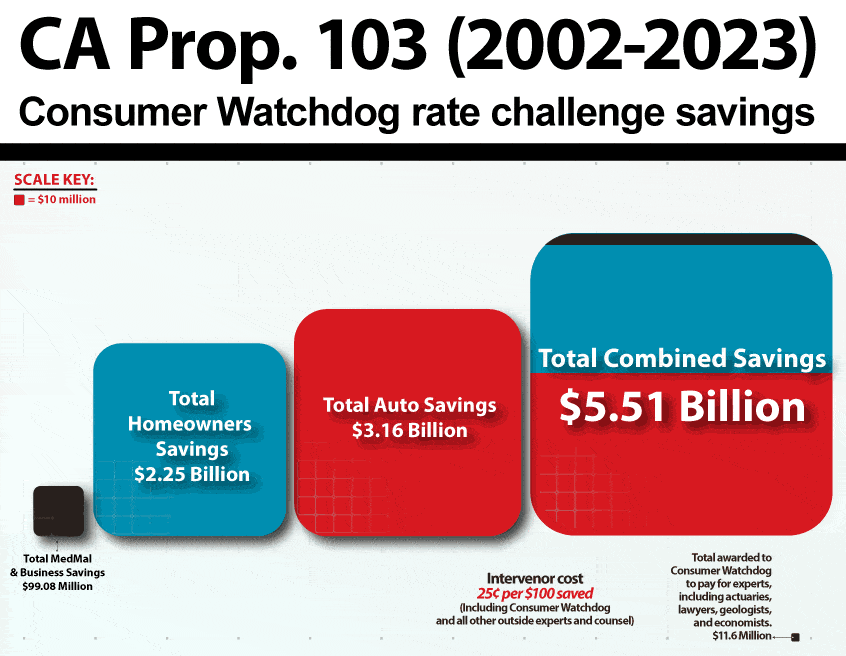Prop 103 California Insurance Reform
Click the image for a detailed Prop 103 Rate Savings Chart
Resources
The Provisions of Prop 103 It pays to know your rights! Read up on each provision of the proposition. Insurance Reform in California: The 1988 Battle for Proposition 103 Read a history of the $80 million “David vs. Goliath” battle to reform California’s insurance industry at the ballot box. Auto Insurance Crisis & Reform Excerpt from Harvey Rosenfield’s University of Memphis Law Review article on Prop 103. Explains the purpose and impact of the proposition’s main reforms. Proposition 103’s Impact on Auto Insurance Premiums in California This 2019 study by J. Robert Hunter of the Consumer Federation of America shows that Proposition 103 has saved Californians $154 billion on our auto insurance premiums and is the only state where auto insurance premiums actually went down since 1988. (Read the news release) Consumer Watchdog’s 2007 Report Showing the impact of Prop. 103 with 15 years of Prop 103 data. (Read the news release)
Excerpt from Harvey Rosenfield’s University of Memphis Law Review article on Prop 103. Explains the purpose and impact of the proposition’s main reforms. Proposition 103’s Impact on Auto Insurance Premiums in California This 2019 study by J. Robert Hunter of the Consumer Federation of America shows that Proposition 103 has saved Californians $154 billion on our auto insurance premiums and is the only state where auto insurance premiums actually went down since 1988. (Read the news release) Consumer Watchdog’s 2007 Report Showing the impact of Prop. 103 with 15 years of Prop 103 data. (Read the news release)
The Battle Continues
 Back in 1988, insurance companies spent $80 million in their campaign to defeat Prop 103. We beat them, but that was only the beginning of the battle. Since then, insurers have spent millions on ballot initiatives, lobbying and political contributions all geared toward undermining the voter-approved reforms. In 2006, insurers unsuccessfully sued to block implementation of Prop 103 rules requiring auto insurers to base premiums primarily on driving safety record rather than a motorist’s ZIP Code. In 2010, Mercury Insurance sponsored Proposition 17, which would have repealed Prop 103’s prohibition against discriminating against customers who didn’t have auto insurance at some point in the prior five years. Consumer Watchdog’s advocacy affiliate Campaign for Consumer Rights successfully defeated that proposal. Insurance companies oppose regulation and other reforms that limit their conduct. Instead, they lobby for legislation that restricts, rather than expands, the rights of consumers — “tort reform.” There are big differences between consumer-backed reforms and the insurance industry campaign, backed by other industries, to restrict the right to go to court. Read the fact sheet we’ve put together to outline the differences. For years, insurers have also tried to replace the personal responsibility insurance system – the driver who causes the accident is responsible for the damages – in California and most common in the U.S. with highly inefficient and unfair “No-Fault” auto insurance schemes. Read a brief history of No-Fault and our report, The Cost of No Fault Auto Insurance, about the failure of No-fault around the country. A critique of the many positive studies conducted by the Rand Corporation is available here.
Back in 1988, insurance companies spent $80 million in their campaign to defeat Prop 103. We beat them, but that was only the beginning of the battle. Since then, insurers have spent millions on ballot initiatives, lobbying and political contributions all geared toward undermining the voter-approved reforms. In 2006, insurers unsuccessfully sued to block implementation of Prop 103 rules requiring auto insurers to base premiums primarily on driving safety record rather than a motorist’s ZIP Code. In 2010, Mercury Insurance sponsored Proposition 17, which would have repealed Prop 103’s prohibition against discriminating against customers who didn’t have auto insurance at some point in the prior five years. Consumer Watchdog’s advocacy affiliate Campaign for Consumer Rights successfully defeated that proposal. Insurance companies oppose regulation and other reforms that limit their conduct. Instead, they lobby for legislation that restricts, rather than expands, the rights of consumers — “tort reform.” There are big differences between consumer-backed reforms and the insurance industry campaign, backed by other industries, to restrict the right to go to court. Read the fact sheet we’ve put together to outline the differences. For years, insurers have also tried to replace the personal responsibility insurance system – the driver who causes the accident is responsible for the damages – in California and most common in the U.S. with highly inefficient and unfair “No-Fault” auto insurance schemes. Read a brief history of No-Fault and our report, The Cost of No Fault Auto Insurance, about the failure of No-fault around the country. A critique of the many positive studies conducted by the Rand Corporation is available here.

